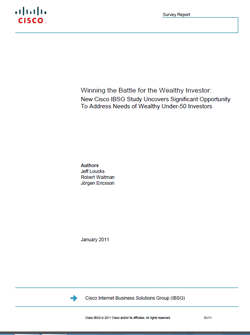Die Ertragschancen für das Geschäft mit Jungen Reichen betragen 31 Mrd. US $. Diese Kundengruppe ließe sich mit neuen Technologien und Services für Private Banking und Wealth Management gewinnen.
As financial services companies look to increase revenues by winning over more investors, Cisco today announced findings from a study that highlights wealthy investors’ attitudes on how they engage with their financial advisers. The second annual Cisco Internet Business Solutions Group (IBSG) Wealth Management Study also reveals a $31 billion revenue opportunity with wealthy investors aged 55 or younger. The study suggests that financial firms can dramatically enhance their revenues and retain wealth in their portfolio by offering more personalized financial services, more frequent interactions via high-quality video conversations and more collaborative technologies that are attractive to these younger investors.
Wealthy investors aged 55 and younger already represent approximately 40 percent of global investable assets, and this share will increase as they age and as they inherit assets from older generations during the next 10 years. The survey shows a significant generational gap: 20 percent of these younger investors plan to change their primary adviser during the next year, whereas only 5 percent of older investors are planning to change. To win over these younger, more tech-savvy investors, the study suggests that financial firms need to offer more frequent interaction with advisers and a higher-quality customer experience. Financial firms can meet this requirement and build trust and loyalty with these investors by engaging with clients through videoconferencing and social media. In fact, 57 percent of these wealthy investors under age 55 would consider moving a portion of their assets to firms that offer a video as a way to connect with their advisers and other experts.
Highlights and Key Facts:
For the Wealth Management Study, Cisco IBSG interviewed more than 1,200 wealthy investors in the United States, United Kingdom and Germany with at least $500,000 in investable assets. It revealed their attitudes about investing; their relationships with financial advisers; and how they prefer to interact with advisers and wealth management firms. Below are highlights from the research.
Market Landscape for Winning Over Wealthy Investors
- Increase Interactions with Next-Generation Family Members. According to industry figures, as much as 98 percent of client assets leave the adviser when the second spouse passes away. To better retain existing clients and retain wealth in their portfolio, financial advisers can increase their interactions with the families of their clients, especially the next generation, by using video and collaboration technologies.
- Recognize Revenue Opportunity. Based on the survey results, Cisco IBSG estimates that for a firm with $200 billion in assets under management and approximately $1.8 billion in revenue, the overall opportunity could be as much as $341 million.
- Step into the Greenfield Market. More than 27 percent of wealthy U.S. investors don’t have a financial adviser at all. However, more than two-thirds of these report that they would consider hiring one under the right circumstances.
- Consolidate Investors and Their Investments. Wealthy investors’ assets are fragmented across multiple firms. In the United States, 77 percent have assets across more than one firm and 36 percent have investments with four or more firms. In Germany, investors are also using close to three firms, whereas in the United Kingdom investors spread their wealth by using an average of more than four firms to hold their assets.
Financial Firms Challenged to Build Trusting Relationship with Clients
- Low Investor Confidence in Advice. Respondents expressed low confidence in the market and financial advisers. Thirty-five percent of wealthy U.S. investors said they believe financial markets don’t provide a level playing field. The numbers are even higher for Germany and the United Kingdom, at 39 percent and 40 percent, respectively.
- Lack of Trust. Only 29 percent of the under-55 group in the United States and 26 percent in the United Kingdom trust the investment advice they receive from financial advisers more than that of their fellow investors.
- Maintaining Long-Distance Relationships. More than 20 percent of wealthy investors in the U.S. and U.K. live more than 50 miles from their financial adviser, and as a result, they rarely meet face-to-face with their adviser.
Technology, Especially Social Media and Video, Offer Gateway for Courting Wealthy Investors
Investors under age 55 desire increased frequency of interaction and a higher-quality customer experience using collaboration and video technology, which can help build trust with financial advisers.
- Number of Technology-Savvy Investors Growing. Seventy-one percent use a PC to check or manage their investments at least once per month (36 percent do so daily), while 28 percent use smartphones and 24 percent use tablets. Forty-nine percent of wealthy investors consider themselves to be “early adopters” of technology or in the “early majority” of those who use new devices and services.
- Demand for Video. About 50 percent of all wealthy investors have used some type of video to meet with friends, family, or colleagues in the past year. And 61 percent of under-55 investors want the option of having video meetings with advisers (in addition to in-person meetings).
- High Use of Social, Mobile and Webinars for Research. A large portion of investors under 55 have strong interest in services that incorporate visual, virtual, social, mobile, blog and webinar activities and 57 percent, 54 percent and 51 percent of investors in U.S., Germany, and the U.K., respectively, are willing to move assets to firms that provide technology-based services.
Quelle: Cisco
Die Studie „Winning the Battle for the Wealthy Investor“ kann hier heruntergeladen werden.




